Equine
Equine Preventative Care:
We believe in working as a team with our clients to provide the best level of care for their equine companions. Most of our horse owners generally see us once a year for their horse's annual exam and vaccinations. During the exam the veterinarian will examine the horse, evaluate any dental issues, and determine which vaccines best fit the horse and owners needs. This is also a good time to address any management issues such as deworming, hoof problems, soreness issues and/or weight problems that your horse may be experiencing.
Vaccinations:
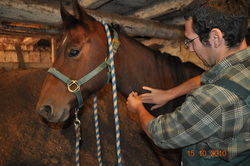
Our recommendation for vaccine protocol depends on what you and your horse will be doing. The core vaccines that we recommend for all horses are Eastern & Western encephalitis, Tetanus, Rabies and West Nile Virus. Recreational and performance horses which are regularly exposed to different horses should also be vaccinated for Influenza, Rhino and Strangles. Horses that are being hauled or are sold need a current Coggins test. Every situation is different and your needs will be evaluated individually for what is best for you and your horse.
Dental Care:
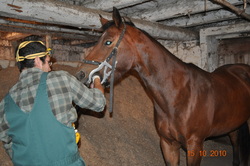
Dental care is important to your horses for their comfort and well being. Horses with dental issues, whether it is a loose cap or sharp points, will not perform to the best of their ability under saddle. Annual exams can help alleviate any potential issues prior to them becoming painful to the horse.
Our veterinarians use a full mouth speculum to fully evaluate the oral cavity; some horses may need light sedation for this. Any problems that are found will be discussed with the owner to determine the best treatment for the horse.
Routine floats are performed using a power float with hand floats to touch up any areas that can not be easily treated with the power float. Extractions or cap removal are also attended to during a dental. Radiographs may be taken if there are signs of periodontal disease, concerns about the integrity of a tooth, or in the case of infection in the oral cavity.
Our veterinarians use a full mouth speculum to fully evaluate the oral cavity; some horses may need light sedation for this. Any problems that are found will be discussed with the owner to determine the best treatment for the horse.
Routine floats are performed using a power float with hand floats to touch up any areas that can not be easily treated with the power float. Extractions or cap removal are also attended to during a dental. Radiographs may be taken if there are signs of periodontal disease, concerns about the integrity of a tooth, or in the case of infection in the oral cavity.
Deworming:
In the last few years deworming recommendations have changed dramatically. We no longer want to deworm a horse every eight weeks 'just because'. Parasite resistance to the different dewormers is what has brought this change on. Now horses should be treated as individuals, this means having regular fecal exams done to determine what type and number of eggs are present. This will help to treat the horse only when needed, and reduce the chance of parasites becoming resistant. Our doctors can help you to determine when to test and what product to use when you do deworm.
Weight Issues:
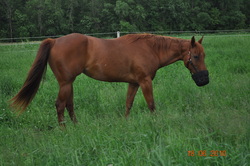
Some horses are very 'easy keepers' and others struggle to hold their weight. We can work with you to help get your horse on the right track.
'Easy keepers' can be prone to excessive weight gain, which can lead to laminitis. These horses can be tested for insulin levels and we can suggest management changes to help maintain a healthy lifestyle for your horse. Radiographs may also be suggested to determine a baseline of hoof health. There are medications available to help insulin resistance and horses with Cushings Disease. These medicines are effective when combined with management changes.
'Hard keepers' struggle to maintain a healthy weight. We start by evaluating their oral health to make sure there are no dental problems. If none are found we evaluate the horse's history, current feeding regimen, and perform a fecal test. The problem can be a range from ulcers to management, we will help you figure it out.
'Easy keepers' can be prone to excessive weight gain, which can lead to laminitis. These horses can be tested for insulin levels and we can suggest management changes to help maintain a healthy lifestyle for your horse. Radiographs may also be suggested to determine a baseline of hoof health. There are medications available to help insulin resistance and horses with Cushings Disease. These medicines are effective when combined with management changes.
'Hard keepers' struggle to maintain a healthy weight. We start by evaluating their oral health to make sure there are no dental problems. If none are found we evaluate the horse's history, current feeding regimen, and perform a fecal test. The problem can be a range from ulcers to management, we will help you figure it out.
Lameness Evaluation:
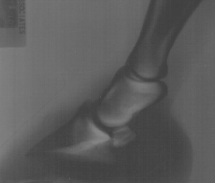
We have the ability to detect and isolate the cause of lameness through the use of flexion tests, nerve blocks (regional anesthesia), radiographic images and digital ultrasound. You may be asked to ride or longe the horse during the exam. The whole horse is examined to determine any additional underlying problems.
A variety of treatments are available depending on the diagnosis, including joint injections, oral medications, topical medications, or referal to other equine hospitals if more complex surgical correction is needed.
A variety of treatments are available depending on the diagnosis, including joint injections, oral medications, topical medications, or referal to other equine hospitals if more complex surgical correction is needed.
Prepurchase Exams:
We routinely perform prepurchase exams for our clients. These can be done at the farm or brought to the clinic for an evaluation. There are different levels of exams that can be performed depending on the proposed use of the horse and the client's wishes. Radiographs are optional at an additional charge.
Ophthamology:
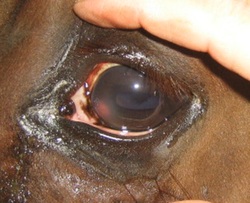
Our veterinarians are fully capable of treating routine and emergency eye conditions. Some the of the more common conditions that we see include corneal ulceration, uveitis, eyelid lacerations, and masses around the eye.
Reproduction:
Our veterinarians are experienced with a variety of reproductive technologies, from live cover to frozen semen. Prior to breeding we can perform uterine cytologies and cultures as well as breeding soundness exams for both mares and stallions. During breeding season mares are routinely checked with a digital ultrasound to determine the optimum insemination time. When the semen arrives whether it is fresh, chilled, or frozen we have the ability to evaluate the motility and quality at our laboratory prior to insemination.
Dr. Herring is also experienced with CEM regulations and is certified to perform testing for your stallions and mares.
Dr. Herring is also experienced with CEM regulations and is certified to perform testing for your stallions and mares.
Surgery:
Castrations: We highly recommend gelding male horses that are not intended for breeding. Patient’s are placed under anesthesia for the procedure.
Mass removal: Horses can develop a variety of lumps, which we can diagnosed and removed in many cases.
Laceration Repair: Horses are predisposed to getting lacerations, cuts, and bruises. Our team is qualified to surgical repair a variety of eye lid and body lacerations.
Tooth Extraction: Older horses are predisposed to tooth root abscess, oral masses, and fractured teeth. Minor extractions and masses can be removed on the farm.
Umbilical and Inguinal Hernia Repairs: Young horses may be born with defects in the body wall that surround the navel, groin, or scrotum. This predisposes them to protrusion of organs out these openings. Surgical repair is needed to correct these defects. Minor defects can be surgical repaired on the farm.
Mass removal: Horses can develop a variety of lumps, which we can diagnosed and removed in many cases.
Laceration Repair: Horses are predisposed to getting lacerations, cuts, and bruises. Our team is qualified to surgical repair a variety of eye lid and body lacerations.
Tooth Extraction: Older horses are predisposed to tooth root abscess, oral masses, and fractured teeth. Minor extractions and masses can be removed on the farm.
Umbilical and Inguinal Hernia Repairs: Young horses may be born with defects in the body wall that surround the navel, groin, or scrotum. This predisposes them to protrusion of organs out these openings. Surgical repair is needed to correct these defects. Minor defects can be surgical repaired on the farm.
Additional Services:
Permanent Identification
Freeze branding and microchipping are available to clients and can be performed on the farm or at the clinic.
Andalusian Breeders
Dr. Herring is certified with the PRE ANCCE for performing inscriptions.
Dr. Degner is approved with the P.R.E. Mundial Registry for inscription services.
Freeze branding and microchipping are available to clients and can be performed on the farm or at the clinic.
Andalusian Breeders
Dr. Herring is certified with the PRE ANCCE for performing inscriptions.
Dr. Degner is approved with the P.R.E. Mundial Registry for inscription services.
Emergency Services:
We have a veterinarian on call 24 hours a day to evaluate and treat any emergencies that arise. After normal business hours your phone call will be forwarded to the voicemail of the doctor on call. Please leave a message including your name, and a phone number that you can be reached at. Your call will be returned as soon as possible, usually within 45 min.
Most emergencies can be dealt with at the farm or stable, however extremely sick or injured horses may require referral to an equine hospital:
Wisconsin Equine Clinic & Hospital
39151 Delafield Rd.
Oconomowoc, WI 53066
tel: (262) 569-1550
http://www.wisconsinequineclinic.com/
Great Lakes Equine Wellness Center
651 Industrial Park Ave.
Hortonville, WI 54944
tel: (920) 779-4444
http://www.glequinewellness.com/
Most emergencies can be dealt with at the farm or stable, however extremely sick or injured horses may require referral to an equine hospital:
Wisconsin Equine Clinic & Hospital
39151 Delafield Rd.
Oconomowoc, WI 53066
tel: (262) 569-1550
http://www.wisconsinequineclinic.com/
Great Lakes Equine Wellness Center
651 Industrial Park Ave.
Hortonville, WI 54944
tel: (920) 779-4444
http://www.glequinewellness.com/
19922 U. S. Hwy 10; Reedsville WI, 54230 Phone: (920) 754-4307 Fax: (920) 754-4430
Text Line: (920) 443-9374 E-mail: [email protected]
